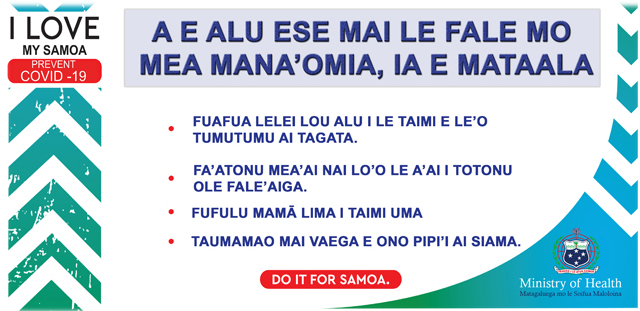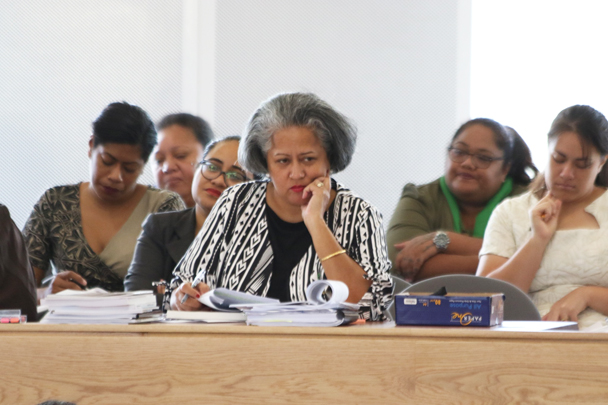
By Staff Writer
Attorney General, Savalenoa Mareva Betham Annandale, has trashed claims of recent changes in the Constitution denying the process of fundamental rights.
Savalenoa argued the process of enforcing fundamental rights under the Judgments Act 1988 and under common law.
Her argument continues a series of public statements to explain and deny criticisms of the changes to the Constitution under the Land and Titles Court, passed in Parliament last year.
Her statement reads :
Samoa‟s current laws of Parliament and case law to date highlight that there are three (3) avenues for the enforcement of fundamental rights, as set out below. It is important to note that no avenues have been removed under the Constitution Amendment Act 2020 (“CAA”) and the Land and Titles Act 2020.
a. Constitution
PART II of the Constitution of the Independent State of Samoa 1960 spells out in 11 Articles one’s fundamental rights.1 Article 4 of the Constitution provides remedies for the enforcement of those rights. The Supreme Court has the power to make any such orders as necessary and appropriate to enforce rights under Part II of the Constitution.
1 Constitution of the Independent State of Samoa: Article 5 Right to life, Article 6 Right to personal liberty, Article 7 Freedom from inhuman treatment, Article 8 Freedom from forced labour, Article 9 Right to a fair trial, Article 10 Rights concerning criminal law, Article 11 Freedom of religion, Article 12 Rights concerning religious instruction, Article 13 Rights regarding freedom of speech, assembly, association, movement and residence, Article 14 Rights regarding property, Article 15 Freedom from discriminatory legislation.

b. Declaratory Judgments under the Declaratory Judgments Act 1988
Fundamental rights may be enforced by the Supreme Court pursuant to its discretionary power under the Declaratory Judgments Act 1988. That is, the Supreme Court may, by application of an affected person, give a declaratory judgment or order determining a person‟s fundamental rights. Where such declaration is made, it is binding on the person making the application and on all persons on whom notice of the motion has been served, and on all other persons who would have been bound by the declaration had it been a court action.
c. Common Law
1. „The Court of Appeal and Supreme Court of Samoa also have other special jurisdictions; this includes common law jurisdiction. The common law of England (English common law) is said to have existed even before the constitutional arrangements of the 17th century which established the supremacy of the English Parliament over the King. The common law is Judge made law. It is a body of law created over the centuries by the English Judges. In the course of time, Judges in New Zealand, Australia and Canada have made significant contributions to the development of the common law.‟2
2. Judicial Review is a type of court proceeding founded on common law, where the Supreme Court, under its inherent jurisdiction (via a judicial review jurisdiction not expressly provided by Samoa‟s Constitution nor by Act of Parliament of Samoa, but by common law), reviews the lawfulness of a decision or action in relation to the fundamental rights, against the Constitution. Where such decision or action is inconsistent with the Constitution, it is declared unconstitutional and therefore null and void.
3. Prior to the reforms, the Supreme Court‟s inherent jurisdiction authorized by common law was applied to hear and determine judicial review proceedings against the decisions of the Land and Titles Court and its Appellate Division. However, under the Constitution Amendment Act 2020, the Constitution now empowers the Land and Titles Court of Appeal and Review to hear and determine all judicial review applications against the decisions of the Land and Titles First Court and Land and Titles High Court.
4. The avenue to judicially review a decision of the LTFC and LTHC affecting one‟s fundamental rights continues in the LTCAR, and is not removed. The Supreme Court retains its inherent jurisdiction to hear all matters of judicial review relating to fundamental rights under Part II of the Constitution.
2 Former Chief Justice, Honoirable Chief Justice Patu Tiavaasue Sapolu, “Parliament and the Courts – XVI Parliament Symposium”; Samoan Parliament Symposium, Tuanaimato, 2016.

It is important to note that the enforcement of fundamental rights continue under the Constitution, an Act of Parliament and through the applicability of common law.

